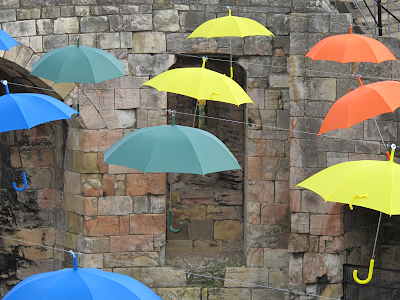We need to be like Esther (Esther 10:4-9), people who will not shrink back in the face of danger but will be bold.
Just as Esther fearlessly facilitated life for her people, so we need to be fervently taking hold of the life that is offered to us and eagerly passing it on!
We desperately need the inner thirst that Chris Duffett expressed.
I long to bring some of that fresh faced faith that I saw in India, a burning desire for Kingdom and urgency in people meeting with God, right in the heart of what I do. I know it’s not down to me, yet I long to be willing…
Bursting with faith and urgency - We need to recognise the 'fresh-faced faith' we see in others and find it in ourselves, we need that 'burning desire for Kingdom' and the 'urgency in people meeting with [Papa]'. Like Chris, we need these things to be 'right at the heart of what [we] do', we need to 'know it's not down to [us]' (it's Jesus who will do it) and of course we need '[to] be willing'.
There are many we can reach who are dying for lack of the river of life within them. Doesn't this bring out the great significance of Jesus' words in Matthew 25:31-46? We have living water, are we going to withhold it?
But in all of this we should also remember that we are his people and that he will guide us moment by moment in our lives. It won't necessarily help to plan our own complex route into unknown territory. Better by far to trust the Guide who has already been there and knows the way - the One who indeed is the Way (John 14:5-7).
The river grows as it flows - Notice how the river grows (Ezekiel 47:3-5). This is not normal in desert country because rivers grow as tributaries join them and tributaries are rare in the desert. If Esther was the river in Mordecai's dream might we all be like rivers? Jesus said we'd do even greater things than him (John 14:11-13). He reached Galilee, Judaea, a limited number in Samaria and a handful of Romans and Greeks. Paul reached much of the northern Mediterranean, in the following 300 years almost all Europe, North Africa, and parts of south-west Asia were reached. And today this river we call the body of Christ has penetrated almost the entire world.
So the river that sprang from Christ flows into the desert country where there is no water, and brings life. The living water is the Holy Spirit (John 7:37-39). And those who are his tributaries are springs of life arising because he is in each one of us. But surely the river in the vision has no tributaries? Ah, but it does. As tributaries we are hidden because we are in Christ. Our little springs of living water are already mingled with his, we don't need to flow into him, we are already in him, we are hidden tributaries and have no independent existence. Apart from him we can do nothing (John 15:4-6).
Seeing it like that might tempt us to think that the river grows because we somehow add our independent little springs of water to his. But it is not like that at all. The spring welling up in me is the living water he provides because Christ himself is the Source living in me and living in you.
The mystery - The source of the river is the temple, specifically the altar in Ezekiel 47:1 or the throne in the city in Revelation 22:1. The altar speaks of the old covenant, of sacrifice and of priesthood. The throne speaks of the new covenant, of rule and of royalty. Jesus is the Lamb, a living sacrifice and he is the King of kings, who rules over all. And we are his royal priesthood (1 Peter 2:9), set apart for his use.
It's a mystery! Jesus is all in all for us who believe, he is absolutely everything we need. What a relief to know that nothing depends on us any more. That doesn't mean that we have no work to do. It means that whatever he calls you to do you will be able to accomplish because he is in you and you are therefore filled with his Spirit!
Part of your calling is already clearly expressed from Jesus' own mouth. Love the Father with everything you have and are (Matthew 22:37). Love one another as Jesus loved those around him (John 13:34-35). Go and make disciples everywhere (Matthew 28:18-20). And so on.
But part of your calling will be shown to you as you go along. The Holy Spirit will reveal it step by step on a need to know basis.
Everyone shout 'HalleluYah!'.
Questions:
- How do you demonstrate your love for the Father?
- Think about your brothers and sisters in Christ, how do they know that you love them?
- Are you actively making disciples?
- How can you improve your listening to the Spirit?
See also:
- Big hearted God - Be the light
- Ezekiel 47:1-12 - Bible Gateway
- Hearing and doing - Journeys of heart and mind
- How's your church making disciples? - Missional challenge
- Organic, simple and missional - Back seat Driver
- Revelation 22:1-5 - Bible Gateway
- Rivers of living water - Journeys of heart and mind







